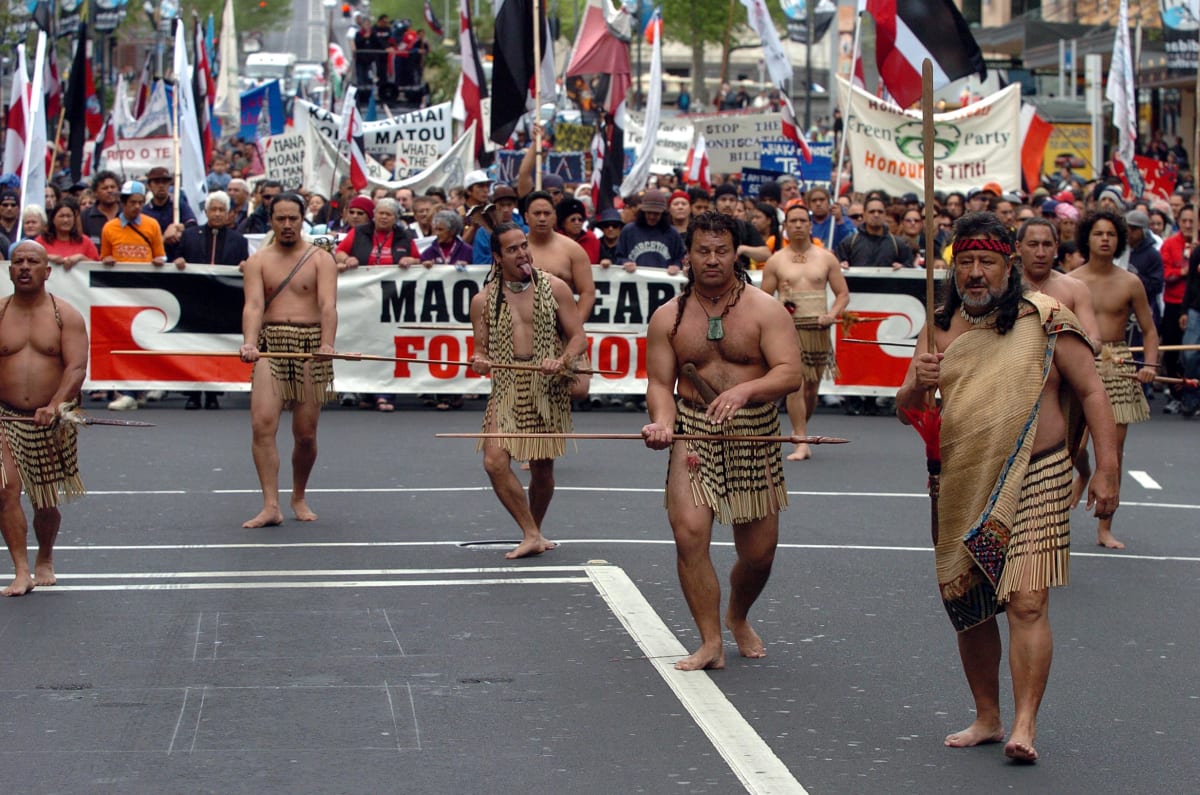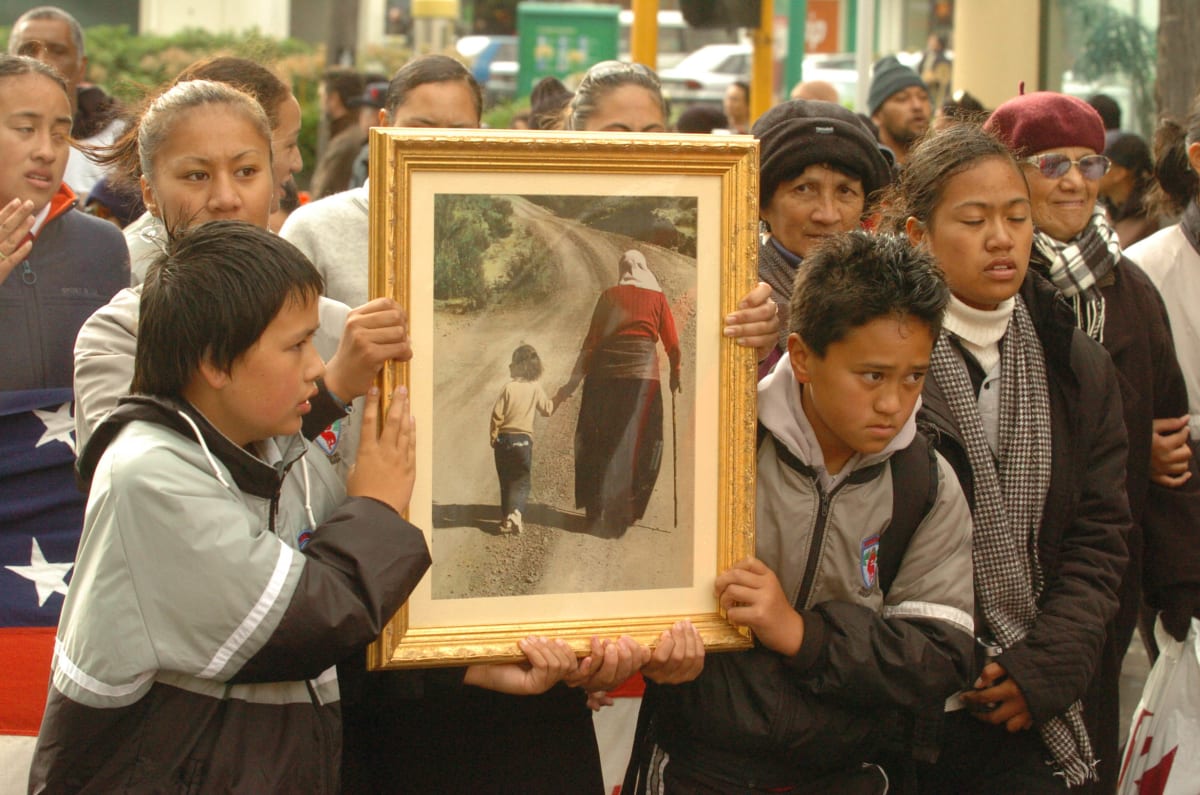COMMENT: By Shilo Kino
What were you doing during the foreshore and seabed hīkoi in 2004?
I wish I could say I was at the protest, gripping the hem of Nana’s dress while she raised her fist in the air, marching for sovereignty, echoing the cries of our tīpuna who were fighting for the very same thing on the very same whenua all those years ago.
But this wasn’t the reality for me and for so many other urban Māori who grew up disconnected from our culture. I was living in Avondale, Auckland and watched the protest unfold on the news. Mum was still at work and I was eating noodles, my homework spread out on the dinner table.
- READ MORE: Other Newsroom articles by Shilo Kino
- Bank’s blurt brings boot from broadcaster – RNZ Mediawatch

A sea of black and white flags flying in the air came on the TV. I remember a wave of emotion coming over me from seeing the crowds of brown faces who looked like me, who looked like my mum, my Nana.
I wish I could say it was a feeling of pride but it wasn’t. I felt whakamā – a word every Māori knows because it is an emotion that has been forced upon us to feel inherently bad for who we are.
The news coverage of the foreshore and seabed told me Māori were greedy, wanted special privileges, were angry over nothing and were trying to ban the public from beaches. It didn’t speak of Māori relationship to the land, the history of land confiscation, the fight for sovereignty or the issues that have come from colonisation and dispossession.
It was a narrative carefully formulated by the media for the intended target audience which was, you guessed it: Pākehā.
Misframing a story just one example
Weaponising activism through misframing a story is just one example. We were also sold a narrative that Māori are the criminals, the baby killers, the gang members, the underachievers, the prisoners, the drug and alcohol addicts.
What do you think this does to a person when you are constantly fed a false narrative of your identity? Your mana diminishes every time you switch on the news, open the newspaper, turn on the radio. Even worse, what happens when you are a child?
The media didn’t care how this narrative would impact me or the thousands of other Māori growing up in urban cities, unsure of who we were, no grandparents alive to teach us our identity, busy parents trying to push us into mainstream because that’s what they were told would be “best” for us and so we were forced to learn about who we are through the eyes of the media. And it wasn’t pretty.
Many years have passed since the foreshore and seabed hīkoi, yet in the year 2021 the same racism exists today, instigated by the same institutions that continue to push this same, tired narrative.
Joe Bloggs calls up a radio station well known to be racist to Māori and says “they’re (Māori) victims of their own genetic background. They are genetically predisposed to crime, alcohol, and underperformance educationally” – and the radio host who used to be the Mayor of Auckland doubles down and says something equally, if not more, racist.
This incident is not shocking to Māori, because we have heard this our whole lives. The question we should be asking ourselves is: How have we allowed the media to get away with this for so long? The continual, blatant attacks against Māori from this particular station have been among the biggest contributors to racism in this country.

There are many examples of racism from this network but I’m not about to dive into its racist history, because I’m tired. We. Are. Tired. Google the radio hosts, look at their Twitter feeds, turn on talkback at any time of the day and the same, racist rhetoric will be there.
Network needs to stop hiding
John Banks deserves criticism but the network needs to stop hiding behind the facade of this being an individual problem. There are many John Banks who come in different forms, some working in the media who get to say whatever they want under the guise of “free speech”. Even the Christchurch terrorist attacks, where a white supremacist murdered 51 people could only keep these people quiet for one week before the station went back to regular, racist programming.
So what happens now? I can predict what will happen because this is the same vicious, ugly cycle. The racist outburst goes viral, there is some outrage. Advertisers pull out, there’s a loss of revenue, the network apologises. The person is fired. Then it happens again the next day, the next week, the next month. It seems it is much more convenient to take out the individual rather than address the racist and colonial system that exists within our media and institutions.
It’s good to see the outpouring of support from Pākehā but we need more than empathy. We need action. You get to feel outraged for a day and then go home and forget about it and not think about it again. Māori can’t switch it off. We experience racism in our workplaces, in everyday life and we have to turn on the media and see it there too.
How many more racist outbursts do you need to hear before something is done? How many more articles do you need to read before there is change?
This isn’t a matter of opinion. This is about human rights.
Shilo Kino is a reporter and the author of her new book The Pōrangi Boy, released last month with Huia publishers. She writes about social issues, justice and identity. This article was first published by Newsroom and is republished on Asia Pacific Report with the author’s permission.
Twitter: @shilokino
